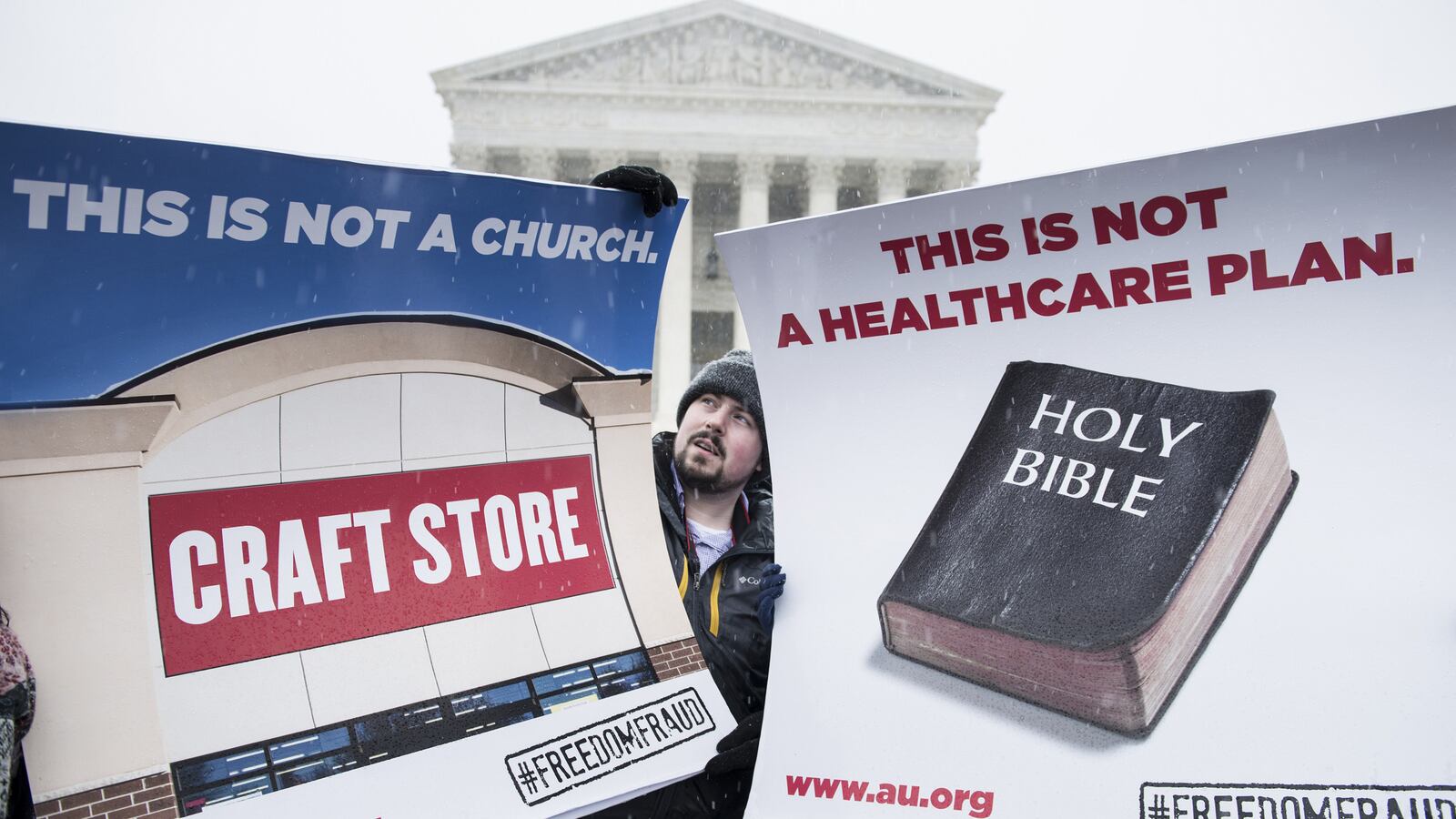Sometime in the next week or two, the Supreme Court will hand down its decision in the Hobby Lobby case, which raises the question of whether a corporation has a legal right to refuse to comply with provisions of the Affordable Care Act that require it to provide contraceptive health insurance coverage for its women employees. Hobby Lobby maintains that it must be granted an exemption from the law because compliance would conflict with the corporation’s religious beliefs.
Although people tend to think the case poses a First Amendment question, in fact it poses only a statutory question: whether the federal Religious Freedom Restoration Act gives Hobby Lobby a statutory right not to comply with the requirements of the Affordable Care Act. Nonetheless, it is important to understand the constitutional background of the case, because that background explains how and why the issue has been framed the way it has.
The First Amendment provides, among other things, that “Congress shall make no law . . . prohibiting the free exercise” of religion. It has long been settled that the Free Exercise Clause forbids the government to discriminate against individuals because of their religion. For example, a law prohibiting Jews from holding public office, forbidding Catholics to attend public schools, or banning Muslims from serving as police officers would clearly violate the Free Exercise Clause.
A more difficult question is whether a law that applies generally, and is not designed to interfere with anyone’s free exercise of religion, but that in practice has an incidental impact on the religious beliefs or activities of some people, also violates the Free Exercise Clause.
The problem of “incidental impact” arises in many different contexts. For example, does a reporter who commits a burglary in order to gather information for a story have a First Amendment (freedom of the press) right to violate the law against burglary?
For a variety of reasons, including (1) the difficulty of determining the actor’s sincerity (suppose a burglar claims to be a reporter), (2) the difficulty of drawing lines between one person and another (suppose one reporter is covering an important story and another is covering a not-so-important story), and (3) the difficulty of balancing the competing interests (is the reporter’s story sufficiently important to justify the burglary?), the Supreme Court has generally been extremely reluctant to hold that laws having only an incidental effect on the exercise of constitutional rights are for that reason unconstitutional as applied to particular persons.
This same issue also arises under the Free Exercise Clause. The Supreme Court first addressed this question in 1879 when it upheld the conviction of George Reynolds, the secretary to Mormon Church leader Brigham Young, for violating a law against bigamy. Although conceding that the law was not directed at Mormons, Reynolds nonetheless maintained that, as applied to him, it violated the Free Exercise Clause because it interfered with his religion’s well-established belief in polygamy. The Supreme Court rejected Reynolds’ claim, holding that the Free Exercise Clause does not prevent the government from even-handedly restricting conduct that society deems inconsistent with “good order,” even if that conduct for some persons is consistent with their religious beliefs.
Eighty-two years later, in Braunfeld v. Brown, the Court considered the constitutionality of a Sunday closing law, which was challenged by Orthodox Jews whose religion required them to close their stores on Saturdays. They maintained that, given the demands of their religion, the Sunday closing law unconstitutionally put them at a severe competitive disadvantage by effectively requiring them to be closed two days each week.
On a 6-3 vote, the Court rejected their Free Exercise claim, explaining that “we are a cosmopolitan nation made up of people of almost every conceivable religious preference,” and it therefore “cannot be expected, much less required, that legislators enact no law regulating conduct that may in some way” disadvantage “some religious sects.” The Court concluded that if the government “regulates conduct by enacting a general law, the purpose and effect of which is to advance the State’s secular goals, the statute is valid despite its indirect burden on religious observance,” said the Court, “unless the State may accomplish its purposes by means which do not impose such a burden.”
That final clause opened the door to the possibility that some religious exemptions might, indeed, be required by the Free Exercise Clause. Two years later, in 1963, the Supreme Court stepped through that door in Sherbert v. Verner. In that case, the Court held that a Seventh-day Adventist could not constitutionally be denied unemployment benefits because of her refusal to work on Saturdays, as required by her religion. The Court ruled that if an otherwise constitutional law imposes a “substantial burden” on an individual’s religious freedom, then the law cannot constitutionally be applied to that individual unless it is narrowly drawn to serve a compelling government interest. Sherbert was a landmark decision of the liberal Warren Court.
But then, in 1990, after the Supreme Court had moved sharply to the right, the Court effectively overruled Sherbert in Employment Division v. Smith. The issue in Smith was whether a state could deny individuals unemployment benefits because they had been dismissed from their jobs because of their unlawful use of peyote. For these individuals, the use of peyote was an essential element of the religious rituals of their Native American Church. The members of the Church maintained that, just as Prohibition had exempted the use of wine by Catholics for sacramental purposes, the anti-peyote law should have exempted the use of peyote by members of the Native American Church for similar religious purposes. Because it didn’t, they argued that, under Sherbert, the First Amendment required such an exemption.
In an opinion by Justice Antonin Scalia, the Court flat-out rejected the proposition that the Free Exercise Clause gives individuals a constitutional right to violate “a generally applicable law that requires (or forbids) the performance of an act that his religious belief forbids (or requires).” Justice Scalia explained that “the government’s ability to enforce generally applicable prohibitions of socially harmful conduct . . . cannot depend on measuring the effects of a governmental action on a religious objector’s spiritual development.” Indeed, “to make an individual’s obligation to obey such a law contingent upon the law’s coincidence with his religious beliefs, except where the state’s interest is compelling, . . . contradicts both constitutional tradition and common sense.”
After Employment Division v. Smith, which remains the law to this day, it is crystal clear that Hobby Lobby has no constitutional right to refuse to provide contraceptive health insurance to its women employees. But Smith was not the end of the story. Three years later, Congress, annoyed by Justice Scalia’s opinion in Smith, enacted the Religious Freedom Restoration Act of 1993 (RFRA), which as a statutory matter now prohibits the federal government from “substantially burdening” a person’s exercise of religion, even if the burden results from a law of general applicability, unless the government can demonstrate that the law is narrowly drawn to further a “compelling governmental interest.”
So, where does that leave us? In practical effect, RFRA reestablished the constitutional rule adopted by the Warren Court in Sherbert, but as a statutory, rather than a constitutional, limitation on the federal government. There are several issues to be decided: (1) Is a corporation a “person” within the meaning of RFRA? (2) Does the insurance requirement “substantially burden” Hobby Lobby’s religious beliefs? (3) Does the government have a sufficiently “compelling interest” in ensuring contraceptive coverage for Hobby Lobby’s women employees? (4) Does the more recently enacted Affordable Care Act effectively override the previously enacted RFRA?
This case might best be understood as part of an increasingly desperate effort of religious adherents to defend themselves against the values of an increasingly secular society. Fifty years ago, largely for religious reasons, the sale of contraceptives, abortion, and same-sex marriage were all illegal. Today, in part as a result of Supreme Court decisions, these are all seen as constitutional rights. Hobby Lobby thus poses an interesting question: If religious adherents can no longer impose their views on the rest of society by prohibiting non-believers from engaging in such sinful behavior as purchasing contraceptives, obtaining abortions, and marrying persons of the same sex, to what extent can the rest of society now impose their views on religious adherents by requiring them to engage in conduct that they find sinful?
For what it’s worth, my guess is that the five “conservative” justices (Roberts, Kennedy, Scalia, Thomas, and Alito) will find in favor of Hobby Lobby on all four questions. But whatever happens, Hobby Lobby represents the dawn of a whole new set of battles over the proper relationship between government and religion in American society.






